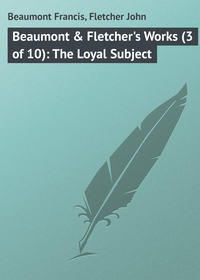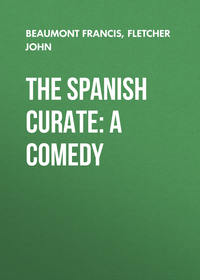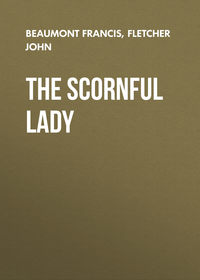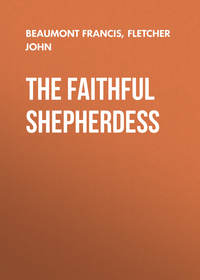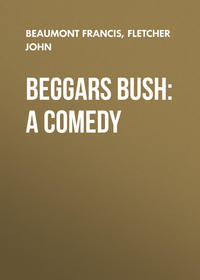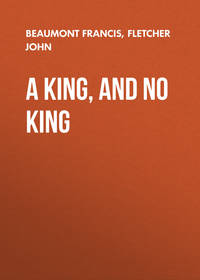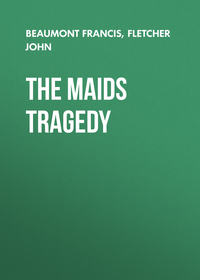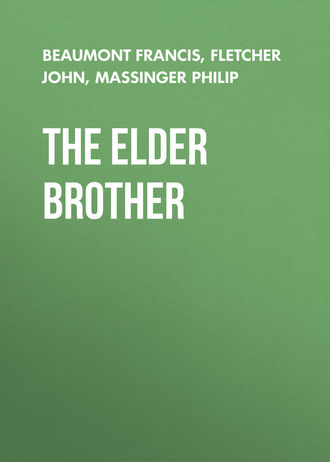
The Elder Brother
Bri. Thou shalt keep thy Farm.
Mir. He does afflict him rarely.
And. You trouble me. Then his intent arriving, the vizard of his hypocrisie pull'd of[f] to the Judge criminal.
Bri. O I am undone.
And. He's put out of Commission with disgrace, and held uncapable of bearing Office ever hereafter. This is my revenge, and this I'll put in practice.
Bri. Do but hear me.
And. To bring me back from my Grammar to my Hornbook, it is unpardonable.
Bri. Do not play the Tyrant; accept of composition.
Lil. Hear him, Andrew.
And. What composition?
Bri. I'll confirm thy Farm, and add unto it a hundred Acres more, adjoyning to it.
And. Umb, this mollifies; but y'are so fickle, and will again deny this, there being no witness by.
Bri. Call any witness, I'll presently assure it.
And. Say you so? troth there's a friend of mine, Sir, within hearing, that's familiar with all that's past, his testimony will be authentical.
Bri. Will he be secret?
And. You may tie his tongue up, as you would do your purse-strings.
Bri. Miramont!
Mir. Ha-ha-ha!
And. This is my witness. Lord how you are troubled! sure you have an Ag[u]e, you shake so with choler: Here's your loving Brother, Sir, and will tell no body but all he meets, that you have eat a Snake, and are grown young, gamesome, and rampant.
Bri. Caught thus?
And. If he were one that would make jests of you, or plague ye, with making your Religious gravity ridiculous to your Neighbours, then you had some cause to be perplex'd.
Bri. I shall become discourse for Clowns and Tapsters.
And. Quick, Lilly, quick, he's now past kissing, between point and point. He swounds, fetch him some Cordial—Now put in, Sir.
Mir. Who may this be? sure this is some mistake: let me see his face, wears he not a false beard? it cannot be Brisac that worthy Gentleman, the Pillar and the Patron of his Country; he is too prudent, and too cautelous, experience hath taught him t'avoid these fooleries, he is the punisher, and not the doer; besides he's old and cold, unfit for Woman: This is some counterfeit, he shall be whipt for't, some base abuser of my worthy Brother.
Bri. Open the doors; will ye imprison me? are ye my Judges?
Mir. The man raves! this is not judicious Brisac: yet now I think on't, h'has a kind of Dog look like my Brother, a guilty hanging face.
Bri. I'll suffer bravely, do your worst, do, do.
Mir. Why, it's manly in you.
Bri. Nor will I rail nor curse, you slave, you whore, I will not meddle with you; but all the torments that e're fell on men, that fed on mischief, fall heavily on you all. [Exit.
Lil. You have given him a heat, Sir.
Mir. He will ride you the better, Lilly.
And. We'll teach him to meddle with Scholars.
Mir. He shall make good his promise t'increase thy Farm, Andrew, or I'll jeer him to death. Fear nothing, Lilly, I am thy Champion. This jeast goes to Charles, and then I'll hunt him out, and Monsieur Eustace the gallant Courtier, and laugh heartily to see 'em mourn together.
And. 'Twill be rare, Sir. [Exeunt.
ACTUS QUINTUS. SCENA PRIMA
Enter Eustace, Egremont, Cowsy.
Eust. Turn'd out of doors and baffled!
Egre. We share with you in the affront.
Cow. Yet bear it not like you with such dejection.
Eust. My Coach and Horses made the ransom of our Cowardize!
Cow. Pish, that's nothing, 'tis damnum reparabile, and soon recover'd.
Egre. It is but feeding a Suitor with false hopes, and after squeeze him with a dozen of Oaths, You are new rigg'd, and this no more remembred.
Eust. And does the Court, that should be the Example and Oracle of the Kingdom, read to us no other Doctrine?
Egre. None that thrives so well as that, within my knowledge.
Cow. Flattery rubs out; but since great men learn to admire themselves, 'tis something crest-faln.
Egre. To be of no Religion, argues a subtle, moral understanding, and it is often cherish'd.
Eust. Piety then, and valour, nor to do and suffer wrong, are they no virtues?
Egre. Rather vices, Eustace; Fighting! what's fighting? it may be in fashion among provant swords, and Buff-jerkin men: But w'us that swim in choice of Silks and Tissues; though in defence of that word Reputation, which is indeed a kind of glorious nothing, to lose a dram of blood must needs appear as coarse as to be honest.
Eust. And all this you seriously believe?
Cow. It is a faith that we will die in, since from the black Guard to the grim Sir in Office, there are few hold other Tenets.
Eust. Now my eyes are open, and I behold a strong necessity that keeps me knave and coward.
Cow. Y'are the wiser.
Eust. Nor can I change my copy, if I purpose to be of your society.
Egre. By no means.
Eust. Honour is nothing with you?
Cow. A meer bubble; for what's grown common, is no more regarded.
Eust. My sword forc'd from me too, and still detain'd, you think 'tis no blemish.
Egre. Get me a Batton, 'tis twenty times more Court-like, and less trouble.
Eust. And yet you wear a sword.
_Cow. Yes, and a good one, a Milan hilt, and a Damasco blade for ornament, not use, the Court allows it.
Eust. Will't not fight of it self?
Cow. I ne'er tri'd this, yet I have worn as fair as any man; I'm sure I've made my Cutler rich, and paid for several weapons, Turkish and Toledo's, two thousand Crowns, and yet could never light upon a fighting one.
Eust. I'le borrow this, I like it well.
Cow. 'Tis at your service, Sir, a Lath in a Velvet Scabbard will serve my turn.
Eust. And now I have it, leave me; y'are infectious, the plague and leprosie of your baseness spreading on all that do come near you; such as you render the Throne of Majesty, the Court, suspected and contemptible; you are Scarabee's that batten in her dung, and have no palats to taste her curious Viands; and like Owles, can only see her night deformities, but with the glorious splendor of her beauties, you are struck blind as Moles, that undermine the sumptuous Building that allow'd you shelter: you stick like running ulcers on her face, and taint the pureness of her native candor, and being bad Servants, cause your Masters goodness to be disputed of; you make the Court, that is the abstract of all Academies, to teach and practise noble undertakings, (where courage sits triumphant crown'd with Lawrel, and wisdom loaded with the weight of honour) a School of Vices.
Egre. What sudden rapture's this?
Eust. A heavenly one, that raising me from sloth and ignorance, (in which your conversation long hath charm'd me) carries me up into the air of action, and knowledge of my self; even now I feel, but pleading only in the Court's defence (though far short of her merits and bright lustre) a happy alteration, and full strength to stand her Champion against all the world, that throw aspersions on her.
Cow. Sure he'll beat us, I see it in his eyes.
Egre. A second Charles; pray look not, Sir, so furiously.
Eust. Recant what you have said, ye Mungrils, and lick up the vomit ye have cast upon the Court, where you unworthily have had warmth and breeding, and swear that you, like Spiders, have made poison of that which was a saving Antidote.
Egre. We will swear any thing.
Cow. We honour the Court as a most sacred place.
Egre. And will make oath, if you enjoyn us to't, nor knave, nor fool, nor coward living in it.
Eust. Except you two, you Rascals.
Cow. Yes, we are all these, and more, if you will have it so.
Eust. And that until you are again reform'd and grown new men, you ne'ere presume to name the Court, or press into the Porter's Lodge but for a penance, to be disciplin'd for your roguery, and this done with true contrition.
Both. Yes, Sir.
Eust. You again may eat scraps, and be thankful.
Cow. Here's a cold breakfast after a sharp nights walking.
Eust. Keep your oaths, and without grumbling vanish.
Both. We are gone, Sir. [Exeunt.
Eust. May all the poorness of my spirit go with you: the fetters of my thraldom are fil'd off, and I at liberty to right my self; and though my hope in Angellina's little, my honour (unto which compar'd she's nothing) shall, like the Sun, disperse those lowring Clouds that yet obscure and dim it; not the name of Brother shall divert me, but from him, that in the world's opinion ruin'd me, I will seek reparation, and call him unto a strict accompt. Ha! 'tis near day, and if the Muses friend, Rose-cheek'd Aurora, invite him to this solitary Grove, as I much hope she will, he seldome missing to pay his vows here to her, I shall hazard to hinder his devotions—The door opens, 'tis he most certain, and by's side my Sword. Blest Opportunity.
Enter Charles.
Char. I have o'er-slept my self, and lost part of the morn, but I'le recover it: Before I went to bed, I wrote some Notes within my Table-book, which I will now consider. Ha! what means this? What do I with a Sword? Learn'd Mercury needs not th' aid of Mars, and innocence is to it self a guard; yet since Arms ever protect Arts, I may justly wear and use it; for since 'twas made my prize, I know not how I'm grown in love with't, and cannot eat nor study, and much less walk without it. But I trifle, matters of more weight ask my judgment.
Eust. Now, Sir, treat of no other Theme, I'le keep you to it, and see y'expound it well.
Char. Eustace!
Eust. The same, Sir, your younger Brother, who, as duty binds him, hath all this night (turn'd out of door) attended, to bid Good-morrow t'ye.
Char. This not in scorn, commands me to return it. Would you ought else?
Eust. O much, Sir, here I end not, but begin; I must speak to you in another strain than yet I ever us'd; and if the language appear in the delivery rough and harsh, you (being my Tutor) must condemn your self, from whom I learn'd it.
Char. When I understand (be't in what style you please) what's your demand, I shall endeavour, in the self-same phrase, to make an answer to the point.
Eust. I come not to lay claim to your birth-right, 'tis your own, and 'tis fit you enjoy it; nor ask I from you your learning and deep knowledge; (though I am not a Scholar as you are) I know them Diamonds by your sole industry, patience and labour, forc'd from steep Rocks, and with much toil attended, and but to few that prize their value granted, and therefore without Rival freely wear them.
Char. These not repin'd at (as you seem t'inform me) the motion must be of a strange condition, if I refuse to yield to't; therefore, Eustace, without this tempest in your looks, propound it, and fear not a denial.
Eust. I require then (as from an Enemy, and not a Brother) the reputation of a man, the honour, not by a fair War won when I was waking, but in my sleep of folly ravish'd from me; with these, the restitution of my Sword, with large acknowledgment of satisfaction, my Coach, my Horses; I will part with life, ere lose one hair of them; and, what concludes all, my Mistris Angellina, as she was before the musical Magick of thy tongue inchanted and seduc'd her. These perform'd, and with submission, and done publickly, at my Father's and my Uncle's intercession, (that I put in too) I perhaps may listen to terms of reconcilement; but if these, in every circumstance, are not subscrib'd to, to the last gasp I defie thee.
Char. These are strict conditions to a Brother.
Eust. My rest is up, nor will I give less.
Char. I'm no Gamester, Eustace, yet I can ghess your resolution stands to win or lose all; I rejoyce to find ye thus tender of your honour, and that at length you understand what a wretched thing you were, how deeply wounded by your self, and made almost incurable in your own hopes, the dead flesh of pale cowardise growing over your festred reputation, which no Balm or gentle Unguent could ever make way to; and I am happy that I was the Surgeon that did apply those burning corrosives, that render you already sensible o'th' danger you were plung'd in, in teaching you, and by a fair gradation, how far, and with what curious respect and care the peace and credit of a man within, (which you ne'er thought till now) should be preferr'd before a gawdy outside; pray you fix here, for so far I go with you.
Eust. This discourse is from the subject.
Char. I'le come to it, Brother; but if you think to build upon my ruines, you'll find a false foundation: your high offers, taught by the Masters of dependencies, that by compounding differences 'tween others, supply their own necessities, with me will never carry't: as you are my Brother, I will dispense a little, but no more than honour can give way to; nor must I destroy that in my self I love in you; and therefore let not hopes or threats persuade you I will descend to any composition for which I may be censur'd.
Eust. You shall fight then.
Char. With much unwillingness with you; but if there's no evasion—
Eust. None.
Char. Hear yet a word; as for the Sword and other fripperies, in a fair way send for them, you shall have 'em. But rather than surrender Angellina, or hear it again mention'd, I oppose my breast unto loud thunder, cast behind me all tyes of Nature.
Eust. She detain'd, I'm deaf to all persuasion.
Char. Guard thy self then. Eustace; I use no other Rhetorick.
Enter Miram.
Mir. Clashing of swords so near my house! Brother oppos'd to Brother! here's no fencing at half sword; hold, hold, Charles, Eustace.
Eust. Second him, or call in more help. Come not between us, I'le not know nor spare you; D'ye fight by th' book?
Char. 'Tis you that wrong me, off Sir, and suddenly, I'le conjure down the Spirit that I have rais'd in him.
Eust. Never, Charles, 'tis thine, and in thy death, be doubled in me.
Mir. I'm out of breath, yet trust not too much to't, Boys; for if you pause not suddenly, and hear reason, do, kill your Uncle, do; but that I'm patient, and not a cholerick old teasty fool, like your Father, I'd dance a matachin with you, should make you sweat your best bloud for't; I would, and it may be I will. Charles, I command thee, and Eustace, I entreat thee, th'art a brave Spark, a true tough-metall'd blade, and I begin to love thee heartily; give me a fighting Courtier, I'le cherish him for example; in our Age they're not born every day.
Char. You of late, Sir, in me lov'd learning.
Mir. True, but take me w'ye, Charles; 'twas when young Eustace wore his heart in's breeches, and fought his Battels in Complements and Cringes, when's understanding wav'd in a flanting Feather, and his best contemplation look'd no further than a new fashion'd doublet; I confess then, the lofty noise your Greek made, only pleas'd me; but now he's turn'd an Oliver and a Rowland, nay, the whole dozen of Peers are bound up in him: Let me remember, when I was of his years, I did look very like him; and did you see my Picture as I was then, you would swear that gallant Eustace (I mean, now he dares fight) was the true substance, and the perfect figure. Nay, nay, no anger, you shall have enough, Charles.
Char. Sure, Sir, I shall not need addition from him.
Eust. Nor I from any, this shall decide my interest; though I am lost to all deserving men, to all that men call good, for suffering tamely insufferable wrongs, and justly slighted by yielding to a minute of delay in my revenge, and from that made a stranger unto my Father's house and favour, o'erwhelm'd with all disgraces; yet I will mount upward, and force my self a fortune, though my birth and breeding do deny it.
Char. Seek not, Eustace, by violence, what will be offer'd to you on easier composition; though I was not alli'd unto your weakness, you shall find me a Brother to your bravery of spirit, and one that, not compell'd to't by your sword, (which I must never fear) will share with you in all but Angellina.
Mir. Nobly said, Charles, and learn from my experience, you may hear reason, and never maim your fighting; for your credit, which you think you have lost, spare Charles, and swinge me, and soundly; three or four walking velvet Cloaks, that wear no swords to guard 'em, yet deserve it, thou art made up again.
Eust. All this is Lip-salve.
Mir. It shall be Hearts-ease, Eustace, ere I have done; as for thy Father's anger, now thou dar'st fight, ne'er fear it, for I've the dowcets of his gravity fast in a string, I will so pinch and wring him, that, spight of his authority, thou shalt make thine own conditions with him.
Eust. I'le take leave a little to consider.
Char. Here comes Andrew.
Mir. But without his comical and learned face; what sad disaster, Andrew?
And. You m[a]y read, Sir, a Tragedy in my face.
Mir. Art thou in earnest?
And. Yes, by my life, Sir; and if now you help not, and speedily, by force, or by persuasion, my good old Master (for now I pity him) is ruin'd for ever.
Char. Ha, my Father!
And. He, Sir.
Mir. By what means? speak.
And. At the suit of Monsieur Lewis; his house is seiz'd upon, and he in person is under guard, (I saw it with these eyes, Sir) to be convey'd to Paris, and there Sentenc'd.
Mir. Nay, then there is no jesting.
Char. Do I live, and know my Father injur'd?
And. And what's worse, Sir, my Ladie Angellina—
Eust. What of her?
And. She's carri'd away too.
Mir. How?
And. While you were absent, a crew of Monsieur Lewis friends and kinsmen, by force, brake in at th' back part of the house, and took her away by violence; faithful Andrew (as this can witness for him) did his best in her defence, but 'twould not do.
Mir. Away, and see our Horses sadled, 'tis no time to talk, but do. Eustace, you now are offer'd a spatious field, and in a pious War to exercise your valour; here's a cause, and such a one, in which to fall is honourable, your dutie and reverence due to a fathers name commanding it; but these unnatural jars arising between Brothers (should you prosper) would shame your victory.
Eust. I would do much, Sir, but still my rep[u]tation!
Mir. Charles shall give you all decent satisfaction; nay, joyn hands, and heartily, why, this is done like Brothers; and as old as I am, in this cause that concerns the honour of our Family, Monsieur Lewis (if reason cannot work) shall find and feel there's hot blood in this arm, I'le lead you bravely.
Eust. And if I follow not, a cowards name be branded on my forehead.
Char. This spirit makes you a sharer in my fortunes.
Mir. And in mine, of which (Brisac once freed, and Angellina again in our possession) you shall know, my heart speaks in my tongue.
Eust. I dare not doubt it, Sir. [Exeunt.
ACTUS V. SCENA II
Enter Lewis, Brisac, Angelli[n]a, Sylvia, Officers.
Lew. I'm deaf to all perswasions.
Bri. I use none, nor doubt I, though a while my innocence suffers, but when the King shall understand how false your malice hath inform'd him, he in justice must set me right again.
Ang. Sir, let not passion so far transport you, as to think in reason, this violent course repairs, but ruins it; that honour you would build up, you destroy; what you would seem to nourish, if respect of my preferment or my pattern may challenge your paternal love and care, why do you, now good fortune has provided a better Husband for me than your hopes could ever fancy, strive to rob me of him? In what is my Lord Charles defective, Sir? unless deep Learning be a blemish in him, or well proportion'd limbs be mulcts in nature, or, what you only aim'd at, large Revenues, are, on the sudden, grown distasteful to you. Of what can you accuse him?
Lew. Of a Rape done to Honour, which thy ravenous lust made thee consent to.
Syl. Her lust! you are her Father.
Lew. And you her Bawd.
Syl. Were you ten Lords, 'tis false; the pureness of her chaste thoughts entertains not such spotted instruments.
Ang. As I have a Soul, Sir.
Lew. I am not to be alter'd; to sit down with this disgrace, would argue me a Peasant, and not born Noble: all rigour that the Law, and that increase of power by favour yields, shall be with all severity inflicted; you have the King's hand for't, no Bail will serve, and therefore at your perils, Officers, away with 'em.
Bri. This is madness.
Lew. Tell me so in open Court, and there I'le answer you.
Enter Miramont, Charles, Eustace, Andrew.
Mir. Well overtaken.
Char. Ill if they dare resist.
Eust. He that advances but one step forward dies.
Lew. Shew the King's Writ.
Mir. Shew your discretion, 'twill become you better.
Char. Y'are once more in my power, and if again I part with you, let me for ever lose thee.
Eust. Force will not do't, nor threats; accept this service from your despair'd of Eustace.
And. And beware your Reverend Worship never more attempt to search my Lilly pot, you see what follows.
Lew. Is the King's power contemn'd?
Mir. No, but the torrent o' your wilful folly stopp'd. And for you, good Sir, if you would but be sensible, what can you wish, but the satisfaction of an obstinate will, that is not endear'd to you? rather than be cross'd in what you purpos'd, you'll undo your Daughter's fame, the credit of your judgment, and your old foolish Neighbour; make your Estates, and in a Suit not worth a Cardecue, a prey to Advocates, and their buckram Scribes, and after they have plum'd ye, return home like a couple of naked Fowles without a feather.
Char. This is a most strong truth, Sir.
Mir. No, no, Monsieur, let us be right Frenchmen, violent to charge; but when our follies are repell'd by reason, 'tis fit that we retreat, and ne'er come on more: Observe my learned Charles, he'll get thee a Nephew on Angellina shall dispute in her belly, and suck the Nurse by Logick: and here's Eustace, he was an Ass, but now is grown an Amadis; nor shall he want a Wife, if all my Land, for a Joynture, can effect: Y'are a good Lord, and of a gentle nature, in your looks I see a kind consent, and it shews lovely: and do you hear, old Fool? but I'le not chide, hereafter, like me, ever doat on Learning, the meer belief is excellent, 'twill save you; and next love Valour, though you dare not fight your self, or fright a foolish Officer, young Eustace can do it to a hair. And, to conclude, let Andrew's farm b' encreas'd, that is your penance, you know for what, and see you rut no more; you understand me. So embrace on all sides.


